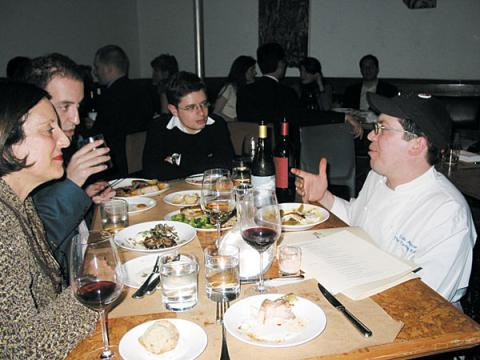|
http://guestofaguest.com/... By Jesse O'Neill February 25, 2009  Artistic director, Marlo Hunter, created “Eating Their Words” for one simple reason: to satiate her mutual love for theater, and eating really good food. “She wanted to see what would happen if she stirred them together.” Her stage is the dinner table itself, the audience sits at tables surrounding the actors. Jesse sat down with Marlo to get the scoop on what it’s like to recreated the dinner theater…literally. Artistic director, Marlo Hunter, created “Eating Their Words” for one simple reason: to satiate her mutual love for theater, and eating really good food. “She wanted to see what would happen if she stirred them together.” Her stage is the dinner table itself, the audience sits at tables surrounding the actors. Jesse sat down with Marlo to get the scoop on what it’s like to recreated the dinner theater…literally.
I will say that since there are three playwrights for any given event, I do have to consider the balance of the evening, and how their voices will complement each other. Additionally, some venues lend themselves to a generally lighter evening, and some are more staid. I bear that in mind when nailing down the playwrights and their particular tone for a given event. So, you got me. I’ll say the Chef comes first (ish).
You refer to Chefs as “artists”. I find most chefs to consider cooking a craft as opposed to an art. Do you think any accomplished chef is capable of combining food and theatre in some way, or does it truly require an artistic approach? A fine example of the chef as artist is Chef Colin Alevras, of the former Tasting Room. Colin took the collaboration with the playwrights like he’d been working that way his whole life. He created dishes for each piece that were not only a careful reflection of what those characters might order, but an exploration of how each character would be represented as a dish. It was remarkable, and hilarious. Also, and I speak about this often, I created this concept because to me, a meal in a restaurant is as close to a theatrical experience and process as possible. The chef/owner is putting on show, which is greater than his/her dishes (the actors). The chef must create the ambiance (setting), the timing of the meal and the nuances of the scenes, and the better the show, the more seamless it is. Like the wings of a stage or the booth in which a stage manager is running the technical elements, the kitchen and front of house staff are working hard and less than gracefully to ensure what happens on their stage looks and feels like magic. Yes, that takes skill. But for the finest chefs, it is an art.
In another example, playwright Annie Baker wrote a phenomenal play for the Waldorf event, in which the way the characters chewed their food dictated the tone of a given moment and added rich emotional texture to the piece as a whole. Here, the food as a prop fortified the characters and helped the audience to identify with their painful interaction, specifically over a meal.
As for the playwrights, I gravitated towards the many I’ve worked with previously, whose work stimulates me, and of course, those I had always wanted to work with. If I could work with David Bouley, I’d die happy. He’s my favorite chef. I’m also interested in working with Brad Farmerie (of Public and Double Crown). I think Mario Batali would get a kick out of the process. And, of course, I have yet to work with a female chef. I’d like to remedy that as soon as possible. In terms of playwrights, I hope bring David Henry Hwang, David Lindsay-Abaire, Douglas Carter Beane and Craig Lucas into the fold (basically, whoever has three names). Tracy Letts would be amazing, as well. So would Paul Rudnick.
When we return with a public event, we are shooting for Blue Hill at Stone Barns with Chef Dan Barber. They are so lovely over there, and are eager to collaborate. So stay tuned! Finally, Eating Their Words is looking to expand internationally. The concept was inspired by ancient Roman “convivia” and I’m working on bringing it back to its conceptual birthplace. |
